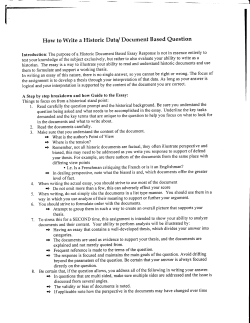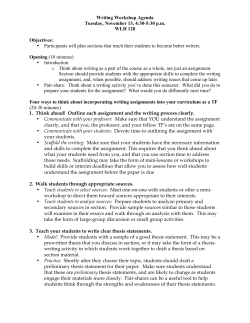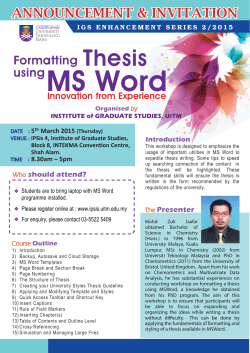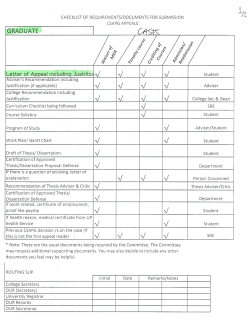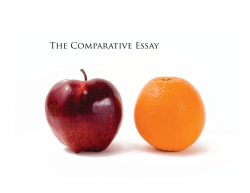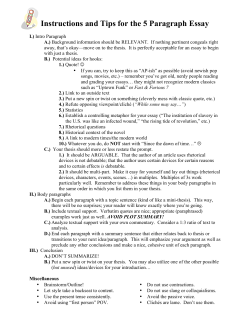
Class of 2015 - Center on Democracy, Development, and the Rule
CDDRL Honors Program Class of 2015 Monica Dey Major: Human Biology Hometown: Nashville, TN Thesis Title: To Save a Mother's Life: A Quantitative Analysis of the Effect of Contraceptive Prevalence on Maternal Mortality Thesis Advisor: Marcella Alsan Why is this topic important to the field of democracy, development, and the rule of law? Sexual and reproductive health is a significant problem all over the world, but especially in developing countries. In Uganda, which has some of the highest fertility and highest maternal mortality rates in the world, investment and improvement in sexual and reproductive health could have enormous consequences for economic development, education equality, and public health. In addition, with the boom in mobile technology in even rural regions, it is essential that civil society organizations and local governments discover the most effective methods to apply this technology to the toughest problems in sexual and reproductive health. I hope to evaluate the pitfalls and potential of these mobile interventions, as well as recommend best practices for the field. What attracted you to the CDDRL undergrad honors program? I love the interdisciplinary environment of the CDDRL, whose professors hail from departments all over the university. I believe it is essential to approach development issues from a multitude of perspectives, and this philosophy is ingrained into the values of the CDDRL. I am so honored to be able to learn from this community of scholars who care deeply about working together to create real impact with their research. Future aspiration post-Stanford: I will continue working on international development issues after graduation, as well as attend medical school after taking a gap year (or two). What are your summer research plans: I will be interviewing a cross-section of Ugandan society (public officials, organizational leaders, local people, and more) both remotely and hopefully in the field. Fun Fact about yourself: I went kayaking for the first time on the Nile River last summer! Selamile Dlamini Major: Management Science & Engineering Hometown: Ezulwini, Swaziland Thesis Title: “Political parties cause divisions”: Exploring Support for Democracy in Swaziland Thesis Advisors: Larry Diamond & Joel Samoff Why is this topic important to the field of democracy, development, and the rule of law? Political science presents several theories about how and why democratization occurs. Despite the democratic transitions that occured in sub-Saharan Africa during the post-colonial period, Swaziland has remained largely politically unchanged. My thesis will present Swaziland's interaction with the theories proposed in of political science, and demonstrate the extent to which events in Swaziland fit into these theories. Moreover, it will show the extent to which Swaziland differs, and presents additional nuance to the theories and models discussed in the field of democracy, development and the rule of law. This is particularly important in sub-Saharan Africa, where the presence and quality of democracy has been shown to be closely correlated to the development outcomes. What attracted you to the CDDRL undergrad honors program? I am inspired by the fact that it is an interdisciplinary program, therefore, I can explore a single subject through multiple lenses. Future aspiration post-Stanford: Eat, pray, love, and make a positive impact in the world. What are your summer research plans: I will get started with the readings on my thesis reading list in June, and go to Swaziland to conduct some interviews in August. Fun Fact about yourself: I love writing fiction! Max Johnson Major: International Relations Hometown: Edina, Minnesota Thesis Title: Can Cuba Liberalize? Using a Comparative Typology of Communist Liberalization to Assess the Island Nation's Prospects for Development Thesis Advisor: Kathryn Stoner Why is this topic important to the field of democracy, development, and the rule of law? Cuba is one of the last staunch political strongholds resisting what many say is an inevitable fall to democracy. I believe understanding how this transition might take place will reveal a lot about democratic development and the formation of free markets. What attracted you to the CDDRL undergrad honors program? I visited Cuba in 2011 and fell in love with the landscape and culture. The Cuban people are so beautiful and eager to live fruitfully and contribute to global society. I want to use my thesis to explore the multiple political perspectives of Cubans in Miami and Havana and try to predict how their lives will change with the end of the Castro regime. Future aspiration post-Stanford: Find a fulfilling career that has an international perspective and will allow me to impact the lives of others in a positive way. And live in New York City. What are your summer research plans: I will be interning at the Project on Government Oversight in Washington D.C. where I'll be learning about corruption and transparency advocacy. I will also spend part of August in Miami interviewing Cuban-American activists and political leaders. Fun Fact about yourself: I was a vegetarian my entire life until last summer when I lived in Port au-Prince, Haiti and was compelled to eat chicken. One thing lead to another and I found myself studying abroad in Madrid eating plates of freshly cured jamon Iberico every week. Needless to say, I've tasted the forbidden fruit, and I'm never going back! Hamin Kim Major: Human Biology Hometown: San Jose, CA Thesis Title: NGOs and Effective Aid Delivery in the Democratic People's Republic of Korea Thesis Advisor: Gary Schoolnik Why is this topic important to the field of democracy, development, and the rule of law? Public health is important to the development and well-being of the local, regional, and global society. Management of infectious diseases also requires much coordination between the existing infrastructure and internal, as well as external resources. My research project on tuberculosis control investigates the process of building a control program for a widespread infectious disease. It illuminates the areas of need for development in the infrastructure and society of the Democratic People’s Republic of Korea, as well as the constraints and challenges in delivering the aid. Examining the management of a public health issue opens up a unique platform to investigate and aid the development of a reclusive nation. What attracted you to the CDDRL undergrad honors program? The CDDRL undergraduate honors program offers the network and support of experts. I was attracted by the multifaceted focus on global issues, and was excited to examine development when democracy and the rule of law may not be manifested in the form that we expect. The required courses and readings would broaden my perspectives about the way that the world functions. Moreover, the expert guidance from professors would help me to apply these new insights to my research topic. The interdisciplinary group of colleagues who would participate in the program with me also attracted me. This is a unique opportunity to learn about global issues through lenses of different expertise and focus. Future aspiration post-Stanford: My Stanford education has prepared me to engage people, culture, and issues with curiosity and critical examination. As a Human Biology major with an area of concentration in Global Health, I have been exposed to various issues which affect the health of many people around the world. After Stanford, I wish to become a physician with a global perspective who cares for patients in the context of their whole persons—their cultural, as well as personal, beliefs. I also hope to be involved in global health policy development and public health management in foreign countries. What are your summer research plans: I will conduct individual interviews with various health experts and gather information through file and literature reviews. Fun Fact about yourself: Something I appreciate about college is that it has developed many new interests which I never knew I had. After joining Testimony A Cappella, I changed from not wanting to sing even in front of my family to breaking out in song and harmonizing whenever and wherever. I have recently revived my love of social dance and hope to pursue this further in my last year at Stanford! Stefan Norgaard Major: Public Policy Hometown: Boulder, Colorado Thesis Title: Rainbow Junction: South Africa’s Born Free Generation and the Future of Democracy Thesis Advisor: Larry Diamond Why is this topic important to the field of democracy, development, and the rule of law? In South Africa today, around 40 percent of the population is under 18 years and fully half of its people are under 25. These young South Africans have grown up in a fully different South Africa than that of their parents: apartheid rule, once a harsh reality, is now a past event even as racial divisions persist, and many youth only know the rule of the African National Congress (ANC) party, which has governed since Nelson Mandela’s 1994 election. This “born free” generation has witnessed the fragile democratic system created by Mandela cave under increasingly stressed institutions during the Mbeki and Zuma presidencies. As young South Africans turn to new methods to make their voices heard, the upcoming 2014 elections may mark the beginning of a period of political realignment, a sounding call for accountable, issue-based governance. In this election, over 4 million of South Africa’s 50 million people will be eligible to vote for the first time, and they are increasingly frustrated about the lack of efficacy in South Africa’s government. A youth population that chooses not to engage through democratic channels may fail to reinvigorate a struggling nation. On the other hand, a population that translates its electoral significance into new government policies can help ignite a long-term political realignment in South African civil society. What attracted you to the CDDRL undergrad honors program? The CDDRL Honors Program offers superb faculty support and mentorship, a cohort of like-minded students pursuing similar thesis topics, and an interdisciplinary framework that allows for a capstone intellectual experience. I heard from previous CDDRL Honors Program participants that Professor Larry Diamond, Professor Frank Fukuyama, and numerous other CDDRL-affiliated faculty support and mentor students, challenging them to produce the best theses they can. In addition, the thesis coursework and Honors College experience allow for students to make close friendships with others interested in democracy, development, and the rule of law. Finally, CDDRL’s interdisciplinary component will allow me to write a thesis on South Africa using historical accounts, ethnographic interviews, and quantitative survey data. Using all three research methods will give me the type of comprehensive intellectual experience I was looking for in my thesis. Future aspiration post-Stanford: Though I am not sure what my future will hold, I hope to spend time working internationally, ideally in public service. I am drawn to social entrepreneurship, civic and political engagement through government service or advocacy, and the nonprofit and nongovernmental sector. I love seeing new places and spending time in the outdoors, and hope that my future allows for such experiences as well. As I learn more about myself as an individual, I hope to discover where I am most effective as an agent of social change and where I feel most passionately about the work I am doing. I hope to ultimately attend law school and advocate on behalf of the public interest. What are your summer research plans: I plan to conduct research in Johannesburg and Bloemfontein, South Africa for my thesis while I work and stay at an urban planning and development nonprofit—the Global Regeneration Initiative for Neighborhood Development (GRIND)—in Johannesburg’s Maboneng Precinct. In my work I will apply coursework in Public Policy and Urban Studies with the larger goal of planning and developing a diverse and integrated urban neighborhood in Johannesburg. A second portion of my summer will be solely dedicated to thesis work in Johannesburg and Bloemfontein. Fun Fact about yourself: A Colorado native, I love climbing and mountaineering. Of the continental United State’s 67 tallest 14,000 foot mountains (also known as “14ers”), I have climbed over 20 of them, and hope to one day climb them all! Cara Reichard Major: Political Science Hometown: Carlsbad, CA Thesis Title: The Logic of International Courts: An Exploration of the East African Court of Justice Thesis Advisor: Stephen Krasner Why is this topic important to the field of democracy, development, and the rule of law? Many subSaharan African nations have, since independence, struggled with the protection of the human rights of their citizens. I believe this topic is important because it will, hopefully, offer perspective on ways in which human rights promotion can best be integrated into the current political and economic situations of these countries. What attracted you to the CDDRL undergrad honors program? Since freshman year I knew that I wanted to write a senior thesis, and CDDRL seemed by far the best fit for my interests. I was also attracted by the idea of being a part of a community of students who also cared about these issues and were eager to answer research questions of their own. Future aspiration post-Stanford: I am still very undecided on my future goals, though I am strongly considering law school. After I graduate from Stanford I hope to spend a few years working in Washington, D.C. on something policy-related. What are your summer research plans: For the first part of the summer I will be in Washington, D.C. working at the U.S. Department of State, Bureau of Democracy, Human Rights and Labor. After that, I will travel to Arusha, Tanzania, to conduct research for my thesis on the East African Court of Justice. Ashley Semanskee Major: Human Biology Hometown: Edmonds, WA Thesis Title: Community Engagement and Accountability in US Urban Public School Districts Thesis Advisor: Martin Carnoy and Susanna Loeb Why is this topic important to the field of democracy, development, and the rule of law? It is important to understand the role of philanthropy and other private actors in public policy debates, particularly in the realm of public education policy because it affects almost every child in the United States. Although philanthropic foundations may be important to drive education reform forward in a stagnant and torpid political process, the political influence of foundations may shut out the contributions of reformers without the wealth to legitimize their ideas, and it may undercut the public’s voice in education reform. Specifically, the school reform movement in recent decades has largely been driven by philanthropic foundations and .has pushed for market-based solutions including small schools, school choice, charter schools, and pay-forperformance schemes for teachers. However, opponents point out that market-based reforms do little to mediate the effect of poverty on education outcomes. Through this thesis, I will explore the education outcomes of opposing reform paradigms, and how philanthropic foundations can be held more accountable to local communities. What attracted you to the CDDRL undergrad honors program? I was attracted to the CDDRL honors program because I want to learn about issues that matter, study the policy debates that are shaping our world and, above all, perform research with real policy implications. I am incredibly grateful for the opportunity work with faculty members and a cohort of like-minded Stanford students as enthusiastic about democracy and development as I am. Future aspiration post-Stanford: After graduation, I hope to pursue my joint interests in health and education policy, and eventually apply to a MPH/MBA program. What are your summer research plans: I will conduct interviews and data collection on the outcomes of public school reform in the Washington DC and New York City school districts. Fun Fact about yourself: Like Garima, I am a twin. I have a sister, Casey, studying business at the University of Washington. Garima Sharma Major: Economics Hometown: New Delhi, India Thesis Title: Factors Shaping Mothers’ Aspirations for their Daughters in India: A Case Study of Forbesganj, Bihar Thesis Advisor: Christine Min Wotipka Why is this topic important to the field of democracy, development, and the rule of law? India is home to 24 million child brides—the largest of any country in the world. The early marriage of a girl represents a trade-off in terms of her education, health and wellbeing. When compared with her overage counterparts, a child bride is twice as likely to suffer from spousal domestic violence, 2.5 times more likely to experience unwanted pregnancies, and 1.5 times more likely to die in child birth; her children are 3 times more likely to be malnourished. Because parents’ decisions for their daughter necessarily follow their aspirations on her behalf, understanding the latter is the first step to formulating policy and programs that alter incentives for encouraging female enrolment in school and delaying child marriage. I hope that my thesis is able to create new knowledge on parental aspirations in pursuit of this goal. What attracted you to the CDDRL undergrad honors program? I am drawn towards the interdisciplinary nature of the CDDRL program because it is well suited for my thesis, which employs a mixed methods design and draws from literature in development economics as well as feminist theory. Incorporating various lenses for analysis will enable me to glean a more holistic understanding of factors that shape parent aspirations (for daughters) than would a purely economic or purely feminist approach. Additionally, I believe that the support provided through the year-long CDDRL Honors Seminar will be invaluable in terms of the design and execution of my field research and data analysis. Finally, I am excited by the prospect of working with a community of scholars (both Professors and peers) who come from many different academic backgrounds and interests, and will, through their insight on my proposed topic, enrich my learning as well as my research. Future aspiration post-Stanford: I hope to leverage policy to advance women’s rights in India and across the world. What are your summer research plans: For the first part of the summer, I will be working as a Stanford in Government Fellow at the International Labour Organization DWT South Asia office in Delhi. I will then travel to Forbesganj, Bihar to conduct field research for my thesis. Fun Fact about yourself: I am one of two. I have a twin sister, named Anima, who attends medical school in India. Thuy Tran Major: Economics Hometown: San Diego, California Thesis Title: Corporate Social Responsibility and Profits: A Tradeoff or a Balance? Thesis Advisor: Stephen Krasner Why is this topic important to the field of democracy, development, and the rule of law? Consumers these days are eager to take part in social change and large corporations have lately made this very easy for consumers; companies like TOMS Shoes that base their business models on charitable giving, as well as companies that attach social causes to their products, are very popular among citizens interested in being "charitable". Obviously, these companies have motivations for participating in social change movements and this recent phenomenon of "corporate social responsibility" shows how corporations are adapting to changing societal preferences. But whether these initiatives are effective is another issue and it is crucial that these companies are not doing more harm than good. Understanding the incentives for firms to engage in social impact is the first step to assessing the level of success of these programs. What attracted you to the CDDRL undergrad honors program? I was drawn to the CDDRL undergraduate honors program because of the possibility to establish strong relationships with my fellow honors students and faculty in the CDDRL. The program offers a chance for students to closely interact with each other during the honors thesis process and I am sure that we will all be able to teach each other something new. I am also very excited to work closely with the CDDRL faculty and for the opportunity to pick their brains! Future aspiration post-Stanford: I would love a career that allows me to combine my technical and artistic interests, that makes me excited to go to work, and that allows me learn new things everyday! What are your summer research plans: I plan on doing extensive research into particular industries that engage in social impact projects, namely consumer brands and also companies that have built their business models on charitable giving. Hopefully I will also have a chance to interview decision makers at these companies as well to better understand the true incentives and thought processes behind corporate social responsibility tactics. Fun Fact about yourself: When I was younger, I used to hate the first day of school because none of my teachers knew how to pronounce my name! Shawn Tuteja Major: Mathematics Hometown: Birmingham, Alabama Thesis Title: Why Groups Divide: Understanding the Mechanisms that Lead to Polarization in Deliberative Polling™ Thesis Advisor: James Fishkin and Alice Siu Why is this topic important to the field of democracy, development, and the rule of law? When deliberative democracy is implemented, it usually takes the form of members of society gathering to debate key issues. Moderators usually facilitate these discussions, and the key assumption is that the moderators do not influence the people's final opinions. I argue that there is a great amount of statistical analysis that has not been done to verify this assumption. If the moderator does contribute to people's opinions, it may mean that we should rethink the institutional design of these processes. What attracted you to the CDDRL undergrad honors program? I have been interested in issues of international affairs and democracy since I was in high school, and I wanted the opportunity to explore these passions in an honors thesis. The CDDRL undergraduate honors program provided the perfect opportunity. Future aspiration post-Stanford: I hope to continue studying and learning skills (such as the ones that I will hone in working on this honors thesis) to better society through whatever job I eventually decide on. What are your summer research plans: I will work to test the mass amounts of data that I will be working with. This includes designing a coding system, running statistical analysis, and analyzing the results. Fun Fact about yourself: I once starred in a PBS TV show on the benefits of recycling. Oh, and I'm a huge fan of the TV show Friday Night Lights.
© Copyright 2025
